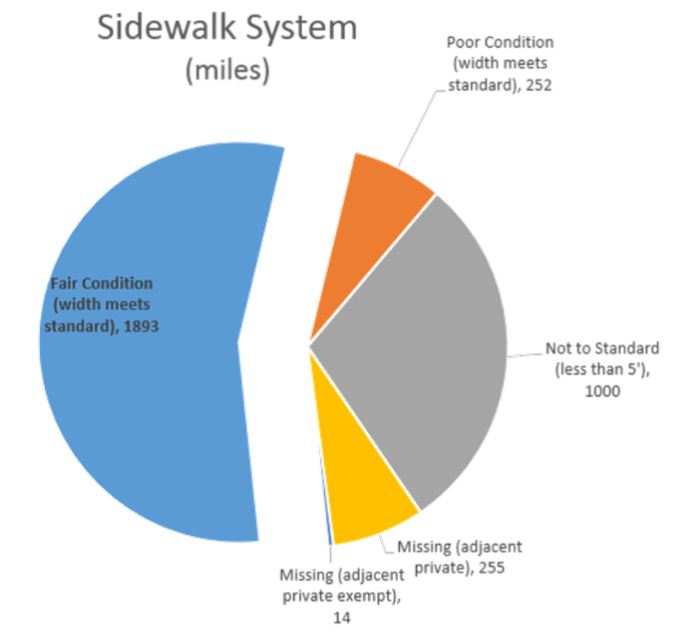Denver Council Weighs Three Options to Fix Broken Sidewalk Network
Yesterday the City Council finally dug into the question of how to complete Denver’s patchwork sidewalk network.

Sidewalk construction and maintenance currently falls entirely on individual property owners. It’s a policy designed to fail, with many people unable to afford sidewalks, and the quality of the pedestrian environment suffering as a result.
People pay with their lives. Between 2012 and 2015, drivers killed 13 people who were walking on streets with incomplete or missing sidewalks, according to an analysis of crash data by WalkDenver.
After several months of hearing testimony, on Wednesday Council members dug into the questions of how to structure a new citywide sidewalk policy and how to pay for it.
All of the options on the table start with the city actively assessing sidewalks like it assesses roads, rather than the current practice of waiting for complaints from residents before taking action. After identifying the locations that need construction or repairs, the burden would still legally lie with residents — but the city would help them pay for it.
Council members weighed three options:
- Letting owners pay in installments over several years
- Charging owners a “pre-paid” fee, similar to a sewage fee, possibly based on the size of the property’s frontage. The resident could opt out if she agreed to pay for a new sidewalk when the time came.
- The city would use money from the general fund to subsidize the cost based on the household’s ability to pay.
Whatever policy the Council lands on, the city will have to identify new revenue streams to fix the sidewalk network. Getting good sidewalks across the city will cost upwards of $475 million, according to rough estimates from Public Works. Councilwoman Stacie Gilmore suggested asking voters to approve a tax hike for sidewalks via a ballot measure. Councilman Jolon Clark and Councilwoman Robin Kniech said a fee would be more appropriate.
“I think that this is an important public piece of infrastructure, and we don’t go out and ask folks if they believe we should have a sewer system or… a police force,” Kniech said. “Individuals may disagree, but we, collectively as a city, have decided that those are pieces [we need].”

A general obligation bond, Kniech said, is also a possibility. The city could take care of a big chunk of missing sidewalks on city-owned land with that money. About 64 miles of missing sidewalks abut parks and parkways.
WalkDenver and other pedestrian advocates have called on the city to take legal responsibility for sidewalks like it does with roads. But concerns about liability may scuttle that idea. Several members said a meeting in executive session with City Attorney David Broadwell scared them off. Broadwell told horror stories of Los Angeles, which agreed to spend $1.3 billion on sidewalks over 30 years after poor conditions prompted a lawsuit under the Americans with Disabilities Act.
WalkDenver Policy Director Jill Locantore said those concerns “may be exaggerated.”
“If the city took over full responsibility for the sidewalks, presumably their liability would be similar to what it currently is for roadways, and they have figured out how to manage that risk in a reasonable manner,” Locantore said. “While L.A. is always held up as a cautionary tale, other cities such as Austin have successfully taken over responsibility for sidewalks without a major lawsuit, because they have been proactive in dedicating funding for sidewalks.”
Taking legal responsibility would be nice, Locantore said, but it’s not the ultimate goal. Finding a secure and sustainable funding source to treat pedestrian infrastructure as an essential part of the transportation network — especially in low-income neighborhoods — is what Denver needs most.
“We’ve already decided this has to be done,” Kniech said. “I think what we should be clear with the public about is how, not whether.”


